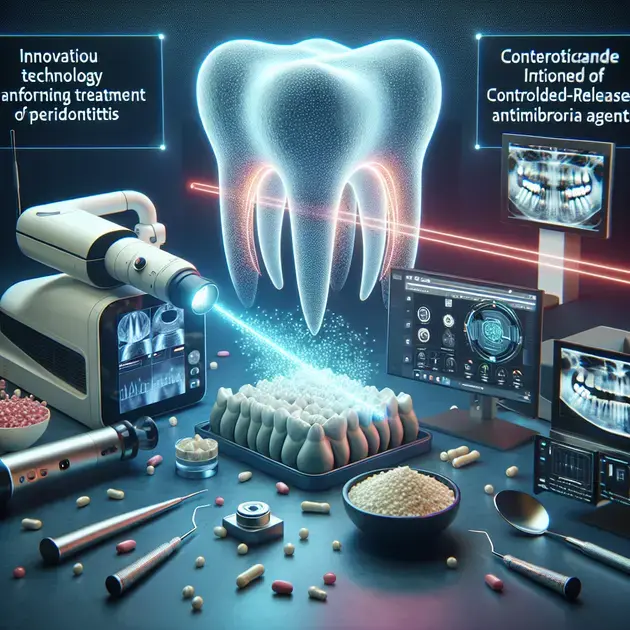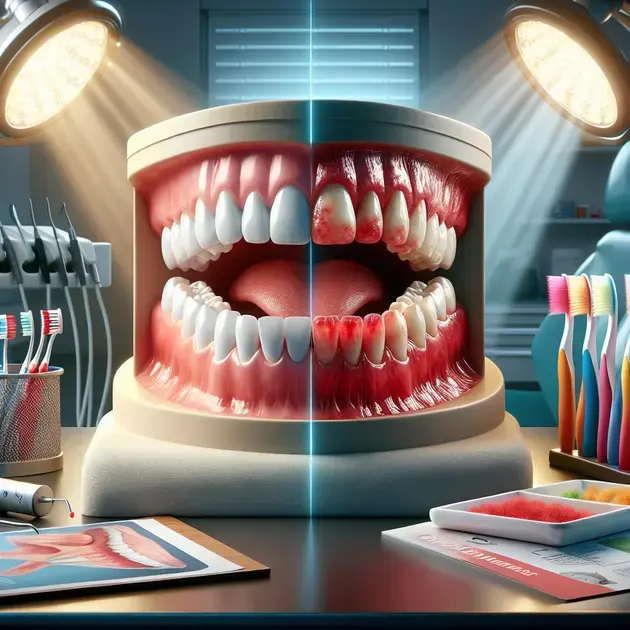Are you looking for effective medication for periodontitis? Look no further! This comprehensive guide will provide you with all the information you need to understand this condition and the best treatment options available.
Periodontitis is a common but serious dental issue that affects millions of people worldwide. With the right medication and treatment plan, you can effectively manage and even reverse the effects of this condition. Read on to discover the most up-to-date strategies for combating periodontitis and improving your oral health.

An Overview of Periodontitis Medication Options
Periodontitis is a serious gum infection that damages the soft tissue and destroys the bone that supports your teeth. It is caused by bacteria in plaque, a sticky film that forms on the teeth. If left untreated, periodontitis can lead to tooth loss. Fortunately, several medication options are available to help manage and treat this condition.
Prescription Antibiotics
One common medication option for periodontitis is prescription antibiotics. These medications are typically used in conjunction with other treatments, such as scaling and root planing, to help control bacterial growth and reduce inflammation in the gums. Your dentist or periodontist may prescribe antibiotics in the form of pills, mouth rinses, or gels to help combat the infection.
Antiseptic Mouthwashes
Antiseptic mouthwashes are another medication option for managing periodontitis. These mouthwashes contain ingredients that help kill bacteria in the mouth and reduce plaque buildup. Using an antiseptic mouthwash as part of your daily oral hygiene routine can help improve gum health and prevent the progression of periodontitis.
Enzyme Suppressants
Enzyme suppressants are medications that help control the enzymes responsible for breaking down the bone and connective tissue in the gums. By inhibiting these enzymes, enzyme suppressants can help slow down the progression of periodontitis and prevent further damage to the gums and bone. These medications are often prescribed in conjunction with other treatment options.
Anti-Inflammatory Drugs
Anti-inflammatory drugs, such as ibuprofen or aspirin, may be recommended to help reduce pain and swelling associated with periodontitis. These medications can help alleviate discomfort and improve the overall healing process. It is important to follow your dentist’s or healthcare provider’s instructions when taking anti-inflammatory drugs to ensure safe and effective treatment.
Topical Treatments
Topical treatments, such as antimicrobial gels or creams, can be applied directly to the gums to help combat infection and reduce inflammation. These medications are often used in conjunction with other treatment options to provide targeted relief and promote healing in the affected areas. Your dentist may recommend specific topical treatments based on your individual needs.
Understanding the Causes and Symptoms of Periodontitis
Periodontitis is a common dental condition that occurs when the tissues surrounding the teeth become inflamed. This inflammation is typically caused by bacteria found in plaque, a sticky film that forms on the teeth. As the bacteria multiply, they release toxins that irritate the gums and trigger an immune response, leading to inflammation and tissue damage.
Potential Causes of Periodontitis
Several factors can contribute to the development of periodontitis, including poor oral hygiene, smoking, and certain medical conditions such as diabetes. Additionally, genetic predisposition and hormonal changes can increase the risk of developing this condition. Understanding the potential causes of periodontitis can help you take proactive steps to prevent and manage the disease.
Common Symptoms of Periodontitis
Some common symptoms of periodontitis include swollen or bleeding gums, persistent bad breath, receding gums, and loose teeth. If left untreated, periodontitis can progress and lead to more severe symptoms, such as tooth loss and bone damage. Recognizing the symptoms of periodontitis early on is crucial for prompt diagnosis and effective treatment.
Diagnosis and Treatment
Diagnosis of periodontitis typically involves a comprehensive dental exam, including a review of your medical history and X-rays to assess the extent of the disease. Treatment options may include professional cleanings, scaling and root planing, antibiotics, and surgical interventions, depending on the severity of the condition. It is important to work closely with your dental provider to develop a personalized treatment plan that addresses your specific needs.
Preventive Measures
Preventing periodontitis involves maintaining good oral hygiene practices, such as brushing and flossing regularly, using antimicrobial mouthwash, and attending regular dental check-ups. Avoiding tobacco products, eating a balanced diet, and managing underlying health conditions can also help reduce the risk of developing periodontitis. By following preventive measures and seeking timely treatment, you can help preserve your oral health and overall well-being.

**Understanding the Importance of Early Diagnosis in Periodontitis Management**
Early Detection for Effective Periodontitis Management
Early diagnosis of periodontitis is crucial for successful treatment and management of the condition. By catching the disease in its initial stages, patients have a better chance of preserving their oral health and preventing further damage to their gums and teeth. Dentists play a key role in identifying the early signs of periodontitis during routine check-ups, such as gum inflammation, bleeding, and pocket formation.
For individuals experiencing these symptoms, seeking prompt dental care is essential for minimizing the progression of the disease. Early intervention can help prevent irreversible damage to the supporting structures of the teeth, such as the bone and ligaments. Additionally, early diagnosis allows for personalized treatment plans to be developed, addressing the specific needs of each patient.
Researchers continue to study the benefits of early detection in periodontitis management, highlighting the importance of regular dental visits and screenings. By raising awareness about the significance of early diagnosis, oral health professionals can empower patients to take proactive steps in maintaining their gum health and overall well-being.
Overall, early diagnosis serves as the foundation for effective periodontitis management, offering patients the best chances for successful treatment outcomes and long-term oral health.
Implementing Preventive Strategies for Periodontitis
In addition to early detection, preventive strategies play a key role in managing periodontitis and reducing the risk of complications. Lifestyle changes, such as maintaining good oral hygiene practices, following a balanced diet, and avoiding tobacco use, can significantly impact the progression of the disease.
Regular brushing and flossing help remove plaque and bacteria that can lead to gum inflammation and periodontal infections. Patients are encouraged to schedule regular cleanings with their dental hygienist to further prevent the buildup of tartar and plaque along the gumline. Adopting a nutritious diet rich in fruits, vegetables, and lean proteins can support gum health and overall immune function.
Avoiding tobacco products, which have been linked to an increased risk of periodontitis and delayed healing, is essential for supporting periodontal treatment outcomes. By making these lifestyle changes, individuals can actively contribute to the management of their condition and improve their overall oral health.
Empowering patients with the knowledge and resources to implement preventive strategies is a critical component of periodontitis treatment. Dental professionals play a key role in educating individuals about the impact of lifestyle choices on their oral health and guiding them towards practices that promote optimal periodontal wellness.
Utilizing Technology for Enhanced Periodontitis Care
Advancements in technology have revolutionized the field of periodontitis treatment, offering innovative solutions for enhancing medication effectiveness and patient outcomes. From laser therapy for targeted gum treatment to digital imaging for precise diagnosis, technology plays a vital role in improving the quality of care for individuals with periodontal issues.
One such innovation is the use of antimicrobial agents delivered through controlled-release systems, which help combat the bacteria responsible for periodontitis. These localized treatments target the infection directly, promoting healing and reducing inflammation in the gum tissues. Additionally, computer-assisted tools allow for accurate treatment planning and monitoring, ensuring optimal results for patients undergoing periodontal therapy.
Telemedicine and virtual consultations have also emerged as valuable resources for individuals seeking periodontitis care, providing convenient access to dental professionals and personalized treatment recommendations. These digital platforms enable patients to receive timely guidance and support, enhancing their overall experience with periodontal treatment.
By embracing the latest technological advancements in periodontitis care, dental practitioners can elevate the standard of treatment offered to patients, leading to improved outcomes and greater patient satisfaction. Integrating technology into treatment protocols not only enhances medication effectiveness but also streamlines the delivery of care, ultimately benefiting individuals undergoing periodontal therapy.
Conclusion
In conclusion, early diagnosis is paramount in effectively managing periodontitis, as it allows for timely intervention to preserve oral health and prevent further damage. Dentists play a crucial role in identifying the initial signs of the disease, emphasizing the importance of routine check-ups for early detection.
Alongside early detection, implementing preventive strategies such as maintaining good oral hygiene, following a balanced diet, and avoiding tobacco use can significantly reduce the risk of complications associated with periodontitis. These lifestyle changes empower individuals to take control of their oral health and contribute to the successful management of the condition.
Moreover, advancements in technology, such as laser therapy and digital imaging, have revolutionized periodontitis treatment, enhancing medication effectiveness and patient outcomes. By embracing these innovations and integrating technology into treatment protocols, dental practitioners can elevate the standard of care, leading to improved treatment outcomes and greater patient satisfaction.



